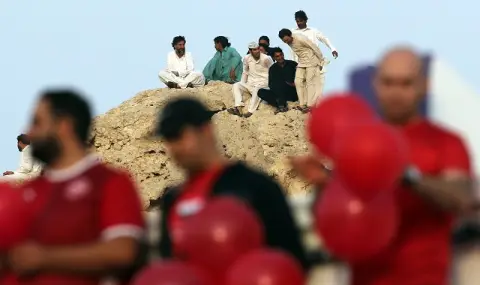Executions without trial and sentence and brutal terror – During the time of Assad, a huge number of crimes were committed in Syria. Many people disappeared without a trace. Several domestic secret services are responsible for torture in prisons.
Talking about his sensitive soul, Asad once shared that he cannot look at blood at all. It's quite strange, considering that Bashar studied to be a doctor, but after the death of his older brother in 1994, he was forced to stop his studies in order to succeed his father in office, ARD writes.
Assad's admission sounds downright cynical when placed in the context of his relentless war against rebels in Syria. Not to mention the country's brutal torture system, which he inherited from his father, Hafez Assad. But under the rule of Bashar Assad, it was further developed and expanded seriously.
Boundless terror
The terror became even more brutal after in 2011 Syrians rebelled against Assad, inspired by the Arab Spring and the fall of other dictators in the region such as Hosni Mubarak in Egypt and Ben Ali in Tunisia.
Assad regularly used the army and secret services against demonstrators in the country. Hundreds of Syrians are said to have been killed in the first weeks of the uprising, mainly by the security services. In the following years, their number increased many times over.
In 2023 “Amnesty International” wrote in a report that several hundred thousand people in Syria have disappeared without a trace, some of them missing for more than 10 years. The document also gives examples of arbitrary killings of activists, ARD recalls.
The Role of the Secret Service
The persecution and torture of suspected or suspected dissidents was carried out mainly by the regime's secret services. Assad relied on a total of four secret services – of the Air Force, Military Intelligence, the Political Intelligence Service and the Main Intelligence Directorate, the German public media explained.
Among them, the secret service of the Air Force was considered the most brutal. It was founded by the former president and father of Bashar - Hafez Assad, who was a pilot, then became commander in chief of the air force. By creating this new intelligence structure, Hafez Assad is acquiring his own instrument of power, ARD points out.
The secret services have a large staff and run numerous prisons, which, according to a report by the European Center for Human Rights, are spread across the country. Probably the most famous of these is the Sednaya military prison on the outskirts of Damascus, which has become a symbol of the oppression of the Assad regime. Thousands of prisoners were executed in Sednaya without trial and sentence.
After the fall of Assad, released prisoners say that they were tortured daily in Sednaya, often to the point of losing their minds. Many were dying. In 2017 “Amnesty International” calls the prison a "slaughterhouse for people".
Tens of thousands of evidence of crimes
The human rights organization “Human Rights Watch“ has also documented serious human rights violations in Syria in numerous reports. Back in 2012 she revealed that the Assad regime has created a total of 27 torture centers in a number of Syrian cities - ten in the capital Damascus, four each in Homs, Latakia and Idlib, three in Daraa and two in Aleppo, ARD recalls.
In 2015 “Human Rights Watch“ published another report containing the testimony of a deserter codenamed “Caesar”. He worked as a forensic photographer for the military police and during his escape took with him more than 50,000 photographs that apparently showed dead or abused prisoners. Among other things, the photos also show how meticulously the Syrian security forces have documented their murders.
Syrian human rights lawyer Anwar al-Buni, who himself spent a long time in a Syrian prison, said in an interview with the Tagesanzeiger newspaper. and the Süddeutsche Zeitung that the secret services used more than 80 types of torture. In addition, there were “indescribable hygienic conditions” in the overcrowded cells. The prisoners were “systematically broken”. This was the “real purpose of the violence”, not obtaining information. Many of the victims' testimonies also repeatedly mention sexual violence as a method of torture.
A system of arrests, torture and human rights violations
In June 2023 The UN General Assembly created a special institution to search for the thousands of people who disappeared without a trace during the civil war in Syria. In September of the same year, Canada and the Netherlands filed a claim against Syria at the International Court of Justice in The Hague for “numerous violations of international law”.
In this regard, ARD recalls that the provisions of the International Court of Justice are usually binding on the respective countries. However, he cannot enforce them, and has to turn to the UN Security Council. There, however, Assad could count on Russia to impose a veto. France issued in 2023 international arrest warrant for Assad – for war crimes in connection with the 2013 poison gas attack in Syria that killed around 1,400 people.
600,000 dead and 130,000 missing
Now, the legal reasoning of the Assad regime is likely to gain further momentum. And the task is gigantic, considering that there are about 600,000 dead during the civil war, as well as 130,000 missing. Whether this process will be crowned with success will also depend on how interested the new rulers in the country are, ARD also points out.
